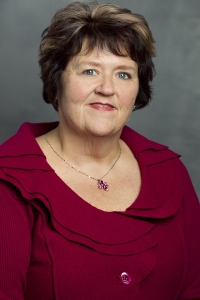Over the last 28 years, the Minnesota Teamsters Service Bureau has progressed from an idea on paper to a fully realized human-services agency that serves both Teamsters families and non-Teamster dislocated workers statewide.
The woman who served as executive director of the Service Bureau for all 28 of those years, Jean Dunn, retired June 27, leaving behind a legacy of service, creativity and commitment to working families.
Ironically, when Dunn accepted the job in February 1986, she never intended to work more than five years with the Teamsters Service Bureau. But Dunn stayed, she said, because she never ran out of new challenges.
“It was such a wonderful opportunity,” Dunn said. “It was a brand new concept. The Teamsters had a vision, and they wanted somebody to implement it. It was just too good an opportunity to pass up.”
The vision that intrigued Dunn so much was this: a service agency that would assist union members with any problems not covered under their collective bargaining agreement. It remains the model for the Teamsters Service Bureau and other union Community Services agencies today.
“We called it a broad-brush human services program,” Dunn recalled. “It meant members could bring anything.”
And the members did just that. Dunn remembers providing assistance to a retiree having trouble balancing his checkbook one day, and to a union member who’s house was going into foreclosure the next.
“It was a very exciting place,” Dunn said. “We could treat the Teamster members with the respect an dignity they deserve, promise them confidentiality and be as creative as we possibly could with their problem solving. It was fabulous.”
Over the course of her 28 years heading the Service Bureau, Dunn never tired of the job, something she attributes to the sky’s-the-limit attitude approach Teamsters leadership encouraged the Service Bureau to adopt. The agency gradually expanded its mission and its reach, creating new challenges and opportunities for Dunn and her co-workers.
Under Dunn’s leadership the Service Bureau began seeking resources for new and innovative programming that would benefit Teamsters on the job, from workplace literacy initiatives to “career laddering” programs.
“I remember one bargaining unit that had gone through a great deal of growth, and the employer had brought in a lot of people from different cultures all at one time,” Dunn said. “It was very difficult for the workforce to know how to work with each other, but we were able to get some funds put together to help these workers understand each other.
“It was a vital and dynamic place to work because the Teamsters were willing to let us do whatever we thought would help the membership.”
At times, Dunn’s work meant she was helping workers outside the Teamsters’ membership as well.
In the 1990s the Service Bureau partnered with the Minnesota Business Partnership – an unlikely alliance, to be sure – to back a charter school, the Skills for Tomorrow High School. It focused on teaching children “what it means to go to work,” Dunn said, and the skills necessary to keep any job across all sectors of the economy.
Dunn also led the Service Bureau’s effort to become an independent grantee of the State of Minnesota’s Dislocated Worker Program, empowering the agency to provide retraining and job-seeking assistance to any worker – Teamster or not – who loses a job through no fault of her own.
“The state came to us and said, ‘We like what you’re doing, would you consider doing this program for non-union members?’” Dunn recalled. “We said sure, why not? If it’s going to help working people and we have the skills to do it, then OK.”
She won’t miss the stress of the job, but Dunn said she will miss working with the Service Bureau staff, the union’s leadership and its members.
“It was always a wonderful opportunity to interact with rank-and-file members and hear what they wanted, what their vision was and how well the Service Bureau was working for them,” Dunn said. “And the Teamsters leadership was a real resource to me on procedure and clarifying their vision to make sure the Service Bureau was always fulfilling their dreams.”
Dunn will be missed, according to people who worked with her, like Don Gerdesmeier of Teamsters Joint Council 32, who was the Service Bureau’s top administrator.
“This was the a perfect job for Jean Dunn,” Gerdesmeier said. “How many people sit across the desk from us and talk to us only because it’s their job? Jean Dunn, she did it because she really cared.
“She had a nice, long run. It was good for her, good for the Teamsters and good for dislocated workers and the families she touched along the way.”
“I congratulate Jean on a successful career,” said Bobby Kasper, president of the St. Paul Regional Labor Federation. “The Teamsters Service Bureau is her legacy, and it’s one that will last a long time.”

Thank you for your excellent article regarding Jean Dunn’s retirement. The staff at Minnesota Teamsters Service Bureau are proud of the time we have worked with Jean, and are very pleased to see her remarkable accomplishments acknowledged within the labor community. Our staff hope to honor Jean as well by continuing the work she began with our Bureau, both through our Family Services for our Brother and Sister Teamsters, and through our Dislocated Worker Program, for the larger community of working people in the state of Minnesota.
Dan Cherryhomes
Executive Director
MN Teamsters Service Bureau